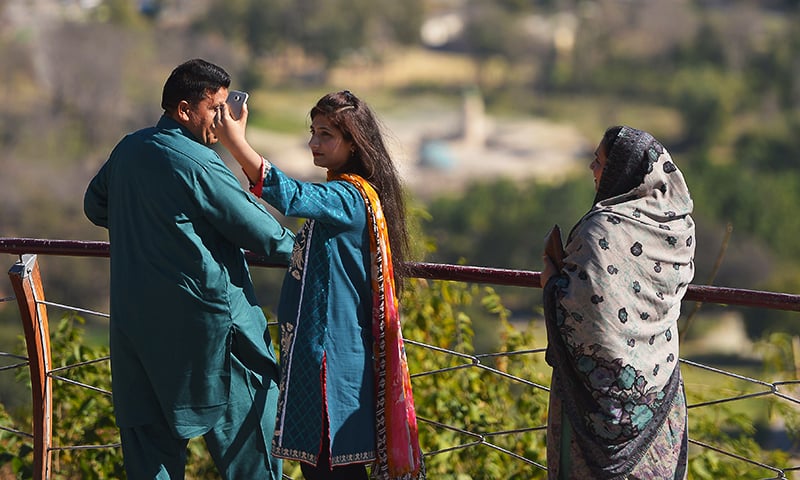ISLAMABAD: Pakistan’s youth are going through a confusing time. The arrival of 3G and 4G services in Pakistan in 2014, and a massive surge in the sale of smartphones has seen an upswing in social media usage, making information about largely taboo subjects, such as love, dating and sex more accessible.
While young people can communicate online in relative freedom, strict religious and familial controls still dictate behaviour. For instance, the "duck-face" selfie shot, which is almost ubiquitous on the social media pages of teens in the West, can present a hazard.
But there is also a sense of growing defiance in the country, where around two-thirds of the population — roughly 180 million people — is believed to be under the age of 30.

Qandeel Baloch, a Kim Kardashian-type figure who has become famous through her tireless self-promotion and suggestive "selfies" posted on social media, has amassed tens of thousands of followers.
On Valentine's Day, the social media starlet donned a plunging scarlet dress and posted a message defying the country's president, who had advised against celebrating the "Western" holiday.
"They can stop people from going out, but they can't stop people from loving," she declared in a Facebook video, going on to branding politicians "idiotic and disgusting".
Baloch is derided and feted in equal measure in Pakistan, but the message appeared to tap into the frustrations of many young people tired of being told how to behave — the footage has been viewed more than 830,000 times, and garnered 7,000 likes and counting.
She shot to fame in Pakistan in 2014 after a video of her pouting for the camera and asking "How em looking?" went viral.
"People are going crazy — especially girls. I get so many calls where they tell me I'm their inspiration and they want to be like me," she told AFP.
Read: Who is Qandeel Baloch and what is she doing on my timeline?
'Why are you smiling?'
A pretty 15-year-old girl strikes a pose and pouts at the camera on her phone, so far so Generation Z, but unlike her teenage counterparts in the West, she stops short of posting the photo on social media, restricted in part by Pakistan's social mores.

"In my pictures, I cannot pout anymore, I've stopped doing that, because otherwise people judge," the young girl told AFP on condition of anonymity.
"You cannot post a picture outside with your friends, because your relatives, or friends, or teachers will criticise you. They will say: 'You look like a slut. Why are you smiling?'," she explained.
"So now, I barely change my profile picture anymore. When I started using social media, I thought I'd be a pretty girl with a lot of friends online. But I'm just an awkward girl with five friends."
The story is echoed by some of her classmates at a middle-income private school in Islamabad, where teenage boys and girls spoke candidly to AFP about their online experiences, but declined to be named.

Globally the perils women face online are well-documented but Pakistan's teenage girls face multiple issues not only can their behaviour be judged as tarnishing the families' reputation or honour, there are rising incidents of cyber-misogyny and harassment.
"When I post pictures I get these creepy stalkers who send me creepy pictures. It really messes you up," said the 15-year-old girl, adding she no longer talks to boys online because of this.
A male classmate agreed: "I don't like selfies. And it's not safe for girls, because it can attract some boy stalkers."
"It all comes back to religion. We are in an Islamic state. People here will judge you because Islam doesn't encourage girls to show their legs, or arms, and it doesn't encourage boys and girls to interact," said one 14-year-old boy who described being scolded by relatives after posting a picture of himself with a girl.
'Don't just blame society'
Cyberspace can turn society's rules upside down, said one 13-year-old boy.
"Online, guys write to girls 'hey baby, let's hook up'," he said to a roar of laughter from his classmates.
Once, he admitted to more scandalised giggles, it was the other way around. "A girl asked me to be friends in an online message. I was scared to death."

Another 15-year-old girl added social media provided them a unique platform for expression. "It's useful to us, it's our own identity. In school you can't always speak your mind. On social media, you can be more open about what you like. You get to be yourself."
Some of AFP's interviewees said they knew of teenagers using fictitious profiles in order to protect their identities and behave more freely.
One young girl commented: "In a Muslim country, it's bad to talk to guys face to face so girls do it online. But it's very risky, some people have fake accounts."
Despite halting the pouting photographs, the 15-year-old girl called on her peers to be more confident online, instead of hiding behind Pakistani cultural restrictions.
She said: "You can't blame society for everything... You can't be a wimp all your teenage life and do nothing. And you can do [something] on social media."
















































